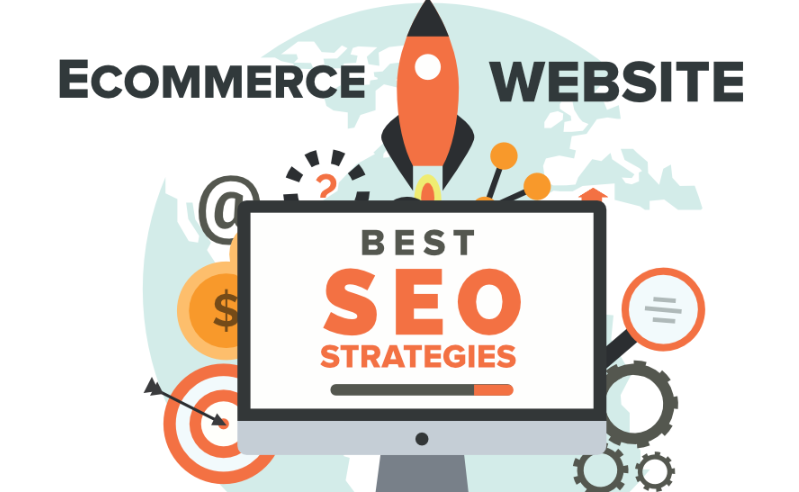Is SEO Worth It for eCommerce?
It has become essential for eCommerce businesses to employ effective strategies to stand out from the crowd. One such strategy is search engine optimization (SEO). In this article, we will explore whether SEO is worth it for eCommerce and how it can benefit online businesses.
Table of Contents
Introduction: The Importance of Online Visibility
In the vast digital landscape, having a strong online presence is crucial for the success of any eCommerce business. With millions of potential customers searching for products and services on search engines like Google every day, being visible in the search results can significantly impact an online store’s traffic, sales, and overall revenue. This is where SEO comes into play.
Understanding SEO for eCommerce
SEO refers to a set of techniques and practices aimed at improving a website’s visibility and ranking in search engine results pages (SERPs). It involves optimizing various aspects of a website, including its content, structure, and technical elements, to make it more search engine-friendly and relevant to the user’s search intent.
For eCommerce websites, SEO focuses on optimizing product pages, category pages, and other relevant sections to attract organic traffic, increase conversions, and ultimately drive sales.
Benefits of SEO for eCommerce
Implementing a well-executed SEO strategy for eCommerce can bring several benefits to online businesses:

a. Increased Organic Traffic
By ranking higher in search results, eCommerce websites can attract more organic traffic. Organic traffic refers to visitors who find your website through non-paid search engine results. These visitors are more likely to be genuinely interested in your products or services, making them valuable potential customers.
b. Higher Conversion Rates
When a website is optimized for relevant keywords and provides a seamless user experience, it increases the chances of converting visitors into customers. SEO helps improve the overall user experience, making it easier for potential customers to find what they need and make a purchase.
c. Cost-Effective Marketing
Compared to other digital marketing strategies, SEO can provide a high return on investment (ROI). While it may require an initial investment and ongoing efforts, the long-term benefits of organic traffic and improved visibility can outweigh the costs associated with paid advertising.
d. Competitive Advantage
In the competitive eCommerce landscape, ranking higher than your competitors can give you a significant advantage. SEO allows you to outperform your competitors in search results, attract more customers, and establish your brand as an authority in your industry.
Challenges and Considerations
While SEO can bring significant benefits to eCommerce businesses, it’s important to be aware of the challenges and considerations associated with it:

a. High Competition
The eCommerce industry is highly competitive, with numerous businesses vying for the top positions in search engine rankings. This means that achieving and maintaining a high ranking requires ongoing effort and continuous optimization.
b. Evolving Algorithms
Search engine algorithms are constantly evolving, which means SEO strategies need to adapt accordingly. Staying up to date with algorithm changes and adjusting your SEO tactics can be time-consuming but essential for maintaining visibility and ranking.
c. Technical Expertise
Effective eCommerce SEO often requires technical expertise in areas such as website structure, page speed optimization, mobile responsiveness, and structured data markup. It may be necessary to work with web developers or SEO professionals to ensure these technical aspects are properly addressed.
d. Long-Term Investment
SEO is a long-term strategy that requires consistent effort and patience. Results may not be immediate, and it takes time to build authority, optimize content, and earn backlinks. It’s important to have realistic expectations and understand that SEO is an ongoing process rather than a quick fix.
Key SEO Techniques for eCommerce
To make the most out of SEO for eCommerce, consider implementing the following key techniques:
a. Keyword Research
Thorough keyword research is essential to identify the terms and phrases potential customers are using to search for products. Targeting relevant keywords in your product descriptions, titles, and metadata can significantly improve your visibility in search results.
b. On-Page Optimization
Optimize your product pages and category pages with relevant keywords, descriptive titles, meta tags, and compelling product descriptions. Ensure your website structure is logical and user-friendly, making it easy for search engines to crawl and index your pages.
c. High-Quality Content
Creating high-quality, informative, and engaging content is crucial for eCommerce SEO. Write detailed product descriptions, informative blog posts, and helpful guides that address your target audience’s pain points and provide valuable information.
d. Link Building
Earning backlinks from reputable websites is an important aspect of SEO. Reach out to industry influencers, bloggers, and relevant websites to showcase your products or collaborate on content. These backlinks can improve your website’s authority and visibility.
e. User Experience Optimization
Provide a seamless and intuitive user experience on your eCommerce website. Optimize page loading speed, ensure mobile responsiveness, and simplify the checkout process. A positive user experience not only helps with SEO but also increases customer satisfaction and conversions.
Building a Solid SEO Strategy for eCommerce
To build a solid SEO strategy for eCommerce, consider the following steps:
a. Set Clear Goals
Define your SEO goals and objectives. Identify specific metrics you want to improve, such as organic traffic, conversion rates, or keyword rankings.
b. Conduct Competitor Analysis
Analyze your competitors’ SEO strategies to identify opportunities and areas for improvement. Understand their keyword targeting, content strategies, and backlink profiles.
c. Perform Technical SEO Audit
Conduct a thorough audit of your website’s technical aspects, including site structure, page speed, mobile optimization, and crawlability. Fix any issues that may hinder search engine visibility.
d. Develop a Content Strategy
Create a content strategy that aligns with your target audience’s needs and interests. Plan regular blog posts, product updates, and informative guides to attract organic traffic and engage your audience.
e. Implement On-Page Optimization
Optimize your product pages, category pages, and other relevant sections with relevant keywords, meta tags, and structured data markup. Ensure your website is easily navigable and user-friendly.
f. Build High-Quality Backlinks
Focus on earning high-quality backlinks from reputable websites in your industry. Collaborate with influencers, participate in industry events, and create shareable content that naturally attracts backlinks.
g. Monitor and Analyze Performance
Regularly monitor your website’s performance using analytics tools. Track key metrics like organic traffic, keyword rankings, conversion rates, and bounce rates. Adjust your SEO strategy based on the insights gained from the data.
The Role of Content in eCommerce SEO
Content plays a vital role in eCommerce SEO. It not only helps improve your website’s visibility in search results but also engages and educates your audience. When creating content for eCommerce SEO, keep the following tips in mind:
- Write compelling and informative product descriptions that highlight the unique selling points and benefits of your products.
- Incorporate relevant keywords naturally throughout your content.
- Utilize product reviews and testimonials to build trust and social proof.
- Create blog posts and articles that address common customer questions, provide helpful tips, and showcase your expertise.
- Use visuals such as images and videos to enhance the user experience and engage your audience.
Remember that quality content that offers value to your audience is more likely to be shared, linked to, and drive organic traffic.
Mobile Optimization and eCommerce SEO
With the increasing use of mobile devices for online shopping, optimizing your eCommerce website for mobile is crucial for SEO success. Here are some tips for mobile optimization:
- Ensure your website is mobile-responsive, adapting to different screen sizes and orientations.
- Optimize page loading speed for mobile devices.
- Implement a user-friendly mobile navigation menu.
- Make sure buttons and forms are easily clickable on mobile screens.
- Use structured data markup to enhance mobile search results, such as displaying product ratings and prices.
By providing a seamless mobile experience, you can improve your search engine rankings and cater to the growing number of mobile shoppers.
Conclusion
In conclusion, SEO is indeed worth it for eCommerce. It is a powerful strategy that can significantly impact the visibility, organic traffic, and sales of online stores. By implementing effective SEO techniques, such as keyword optimization, on-page optimization, content creation, and link building, eCommerce businesses can gain a competitive edge and attract valuable organic traffic.
However, it is important to acknowledge the challenges and considerations associated with SEO and to stay updated with the evolving landscape of search engine algorithms. By investing time, effort, and resources into a well-rounded SEO strategy, eCommerce businesses can reap the long-term benefits of increased visibility, higher conversion rates, and sustained growth.
FAQ
What is the cost of implementing SEO for eCommerce?
The cost of implementing SEO for eCommerce can vary depending on various factors, such as the size of your website, the competitiveness of your industry, and the extent of optimization required. It can involve expenses for keyword research, content creation, technical optimization, and possibly hiring SEO professionals or agencies. Consider it as a long-term investment rather than a one-time cost.
How long does it take to see results from eCommerce SEO?
SEO is a gradual process, and the timeline to see results can vary. It depends on factors such as the competitiveness of your industry, the effectiveness of your SEO strategies, and the current state of your website. Generally, it can take several months to start seeing noticeable improvements in rankings and organic traffic. Patience and consistent effort are key.
Can I do SEO for my eCommerce website on my own?
While it is possible to handle some basic SEO tasks on your own, implementing a comprehensive SEO strategy for eCommerce requires expertise and ongoing dedication. It involves technical aspects, keyword research, content creation, link building, and continuous optimization. Working with experienced SEO professionals or agencies can ensure better results and save time in the long run.
Are there any risks associated with eCommerce SEO?
Like any marketing strategy, there are potential risks with eCommerce SEO. These include over-optimization, using unethical practices that violate search engine guidelines (black hat SEO), or relying solely on SEO without considering other marketing channels. It is important to follow best practices, stay up to date with algorithm changes, and focus on providing a positive user experience.
How can I find the right SEO agency for my eCommerce business?
When choosing an SEO agency for your eCommerce business, consider their experience and track record in working with eCommerce websites. Look for case studies, client testimonials, and reviews. Discuss your specific goals and expectations, and ensure they have a transparent communication process. It’s also beneficial to inquire about their approach to content creation, link building, and analytics/reporting.
















